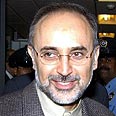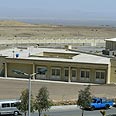

Iran denies building secret nuke facility
Islamic Republic's atomic chief says country has 'no such installation that enriches uranium' and has not been declared to UN nuclear watchdog. US expresses skepticism over latest opposition claims as well. 'There's nothing in the satellite images that suggest a centrifuge plant,' ISIS official says
Iran on Friday denied claims by opposition groups that it was secretly building a new uranium enrichment site deep in the mountains northwest of the capital.
"We have no such installation that enriches uranium and if they (opposition groups) are aware of such a development, they should tell us. We will thank them," the country's atomic chief Ali Akbar Salehi told the Mehr news agency.
"No such nuclear installation with a specific definition exists in Iran which has not been declared to the agency," he said of UN nuclear watchdog the International Atomic Energy Agency (IAEA).
Iranian opposition group the National Council of Resistance of Iran (NCRI) said on Thursday in Washington that in 2005 Iran began building a new uranium enrichment site in Abyek, about 120 kilometers (70 miles) northwest of Tehran.
Iran is currently enriching uranium in the central city of Natanz and is building another such facility at Fordo, southwest of the capital.
Salehi said that nuclear installations have specific purposes.
"Facilities which are used for medical and agriculture purposes are not considered nuclear. There are many such (non-nuclear) facilities in Iran," he said.
Iranian President Mahmoud Ahmadinejad announced in November that Iran will build 10 new uranium enrichment sites. His declaration came after Iran was censured by the IAEA for building the second enrichment facility at Fordo, southwest of the capital.
Last month, Salehi said that construction of one of the 10 new nuclear facilities would begin by the end of the current Iranian year in March 2011, or shortly thereafter.
'Hard to believe'
The United States and other Western powers suspect Iran is using its uranium enrichment program to build an atom bomb. Iran denies the charge, saying its atomic program is for peaceful purposes.
The Pentagon and the independent Institute for Science and International Security (ISIS), meanwhile, expressed skepticism over the latest opposition claims.
"I don't know if this site is one that they have discovered that our intelligence experts have not seen. I find that hard to believe, but we shall see," Pentagon spokesman Geoff Morrell said.
David Albright, the founder of ISIS, said "it's just another one of their results you can't verify. It doesn't hold up very well in our minds. There's nothing in the satellite images that suggest a centrifuge plant."
He told AFP the NCRI have made "a lot of mistakes" with past claims about Iranian nuclear activity and they also "exaggerate their accomplishments dramatically."
The NCRI told Washington reporters that the Abyek site is "controlled, run and operated" by Iran's defense ministry, and that Iranian authorities have so far spent 100 million dollars on the site and completed about 85 percent of the construction.
The UN Security Council imposed a fourth round of sanctions on June 9 over Iran's failure to heed repeated ultimatums to suspend uranium enrichment, the sensitive process which can produce fuel for nuclear reactors or, in highly extended form, the fissile core of an atomic bomb.
The European Union, Japan and the United States have all imposed additional sanctions of their own, over and above the UN ones.
- Follow Ynetnews on Facebook















